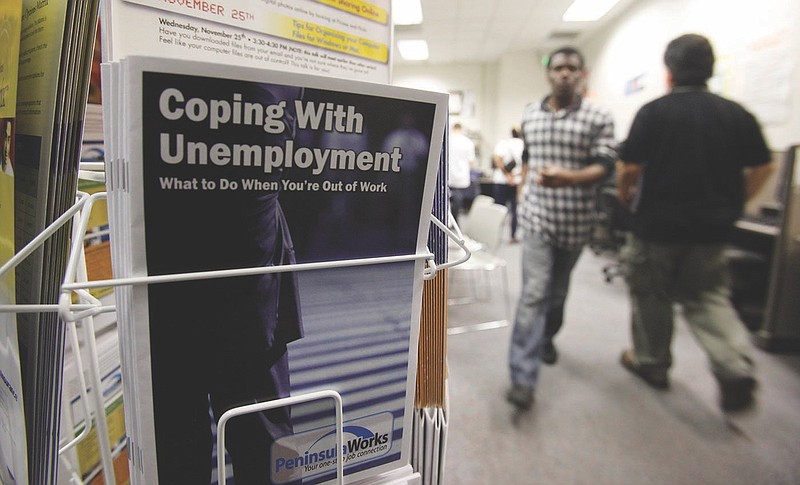With the aid of Uncle Sam, Tennessee should avoid having to triple the tax on employers for unemployment insurance next year despite a record number of persons receiving jobless assistance in the Volunteer State this year.
Unlike most states, Tennessee is using more than a third of its discretionary federal aid for coronavirus response to pay for jobless benefits for unemployed Tennesseans rather than to raise the payroll tax on employers. Since May, Tennessee has allocated $837 million of Coronavirus Aid, Relief, and Economic Security (CARES) Act funds to shore up the solvency of Tennessee's unemployment insurance trust fund to avoid the need for tax increases on employers next year.
Even as the fourth-lowest state for jobless benefits, a new University of Tennessee study estimates employer taxes would have had to increase 300% or more to offset the losses in the unemployment insurance fund if not for the federal dollars put into the unemployment insurance trust fund.
Tennessee's unemployment trust fund was in danger of running out of money earlier this year when the state's jobless rate jumped to a record high 15.5% in April. Tennessee paid out a total $226.4 million in April in state payments to hundreds of thousands of Tennesseans without work, threatening the solvency of a once-$1.2 billion pool that dropped this spring below federally recommended solvency levels.
By using the federal CARES Åct money for the jobless benefit program since the start of May, Tennessee has kept the unemployment insurance fund above $1.1 billion to avoid a legally required tax increase in 2021.
Tennessee Gov. Bill Lee said he has sought to avoid having to raise taxes to make up for funding shortfalls during the coronavirus-spurred recession.
"Preserving Tennessee's thriving economy has been one of my top priorities throughout this pandemic," Lee said.
Lt. Gov. Randy McNalley, R-Oak Ridge, said raising taxes during an economic downturn is the wrong approach and state officials wanted to avoid borrowing more money that could also curb future growth and fiscal options for state government. So the state sought alternatives to the traditional funding mechanism for paying jobless benefits while avoiding the need to take on additional state debt.
"The decision to immediately use federal Coronavirus Relief Fund dollars to bolster our unemployment trust fund protected workers, prevented possible tax increases and will allow employers to continue to hire as our economy recovers and grows," McNally said. "From the beginning of the pandemic, Tennessee's state government made decisions that were thoughtful, forward-thinking and ultimately pivotal."
Since May, all jobless benefits paid to unemployed Tennesseans have come from the federal government rather than the traditional funding source - the unemployment insurance tax on employers.
A few other states, including Idaho and Alabama, have also used federal CARES funds to pay state jobless benefits. But many states have had to borrow money, raise employer taxes or both to maintain such benefits.
In August, the U.S. Treasury Department reported that 19 states had borrowed money from the federal government to maintain their unemployment insurance programs. In Georgia, for instance, an $85 million federal loans was granted to pay unemployment benefits for August as the state's unemployment trust fund balance fell to $385 million, down from over $2 billion in March.
"Tennessee's philosophies are just different than many other states," House Speaker Cameron Sexton, R-Crossville, said. "We want businesses to grow and to thrive. Our goal is to maintain a healthy economic environment that not only creates jobs, but also encourages businesses to prosper.While other states are looking at raising taxes, in Tennessee, we are for lessening tax burdens."
Billy Dycus, president of the Tennessee AFL-CIO labor union and a member of the advisory board that help oversee the payment of jobless benefits in the state, said he is glad that the unemployment trust fund has remained relatively healthy. But he worries that state leaders often prioritize employer interests over those of the state's workers.
Tennessee jobless benefits top out at $275 a week - the fourth lowest among the 50 states. Tennessee also was recently one of the first states to reimpose requirement for jobless benefit recipients to demonstrate and document that they are looking for work.
"I understand that we want our businesses to be successful, but it amazes me that the mindset of many people in our government has changed from "let's take care of the people," to "if we take of businesses, everything else will fall into place,'" Dycus said. "We've become so business oriented, we've forgot about the people."
Dycus said some of the CARES money used for payments into the unemployment insurance fund could have also been used to enhance benefits, especially after the $600 weekly federal supplement expired at the end of July.
Tennessee hasn't raised the $275 maximum weekly benefits paid to unemployed persons since August 2001. Jobless persons may receive such benefits for up to 26 weeks, if they continue to look for other jobs or aren't recalled to their former job.
Bradley Jackson, president of the Tennessee Chamber of Commerce and Industry, said Monday that business groups are open to a possible increase in jobless benefits in Tennessee. But Jackson said as many businesses struggle to recover from the economic slowdown caused by the pandemic, "now is not the time to be raising employer taxes."
Although Tennessee benefits are lower than most states, the threshold for getting benefits is less than some other Southeastern states and the length of time benefits paid for jobless persons is longer than many states, Jackson said.
"In Tennessee, we take pride in having an unemployment insurance program that is efficiently run and maintains a strong balance and that has helped our state's overall business climate," he said.
Contact Dave Flessner at dflessner@timesfreepress.com or at 423-757-6340.


